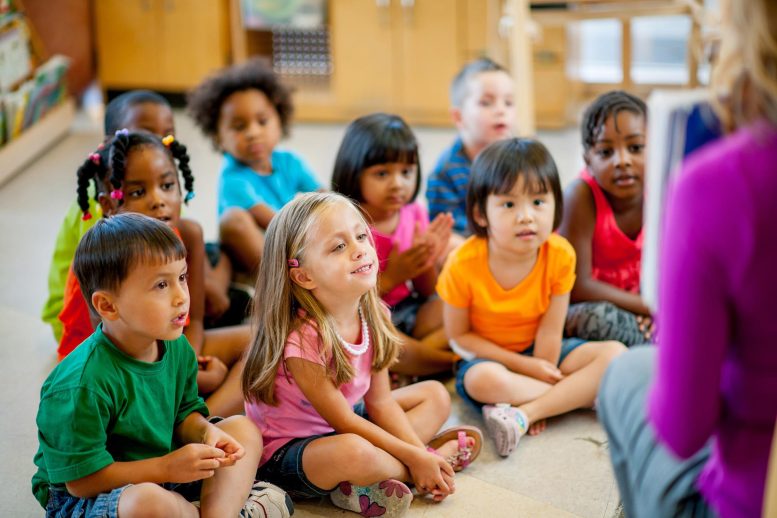
New research indicates that the effectiveness of preschool programs in promoting long-term academic success is unclear, with studies showing a mix of positive, negative, and neutral outcomes.
New review from Teachers College, Columbia University, University of Virginia, University of California-Irvine, and University of Delaware Reveals Varied Impact of Preschool Programs on Long-Term School Success.
Early education programs are widely believed to be effective public investments for helping children succeed in school and for reducing income- and race-based achievement gaps. However, a new groundbreaking study conducted by a team of investigators from Teachers College, Columbia University, University of Virginia, University of California-Irvine, and the University of Delaware finds mixed evidence on the long-term effectiveness of today’s preschool programs for helping children succeed in school.
The study, “Unsettled Science on longer-run effects of early education,” published today (May 2) in the journal Science, examined published evaluations of well-established, publicly funded preschool programs using rigorous designs. The four evaluations reported a mix of positive, negative, and no differences in the school performance of children who did and did not attend preschool programs in elementary school and beyond.
This study challenges prevalent assumptions within the field, emphasizing the importance of identifying the key factors that foster the development of skills crucial for success in both academic endeavors and life, particularly among children from disadvantaged backgrounds.
Mixed Outcomes From Preschool Programs
“Preschool programs have long been hailed as effective interventions, yet our study reveals a more nuanced reality,” says senior author of the study Margaret Burchinal, Research Professor in the Center for Advanced Study of Teaching and Learning, University of Virginia.
“While many presume their positive impact, rigorous evaluations show a mix of outcomes, including both successes and setbacks and, in some cases, no discernible long-term effects. It’s imperative that we design preschool programs to uniformly promote school success, especially for children from families with low income.”
Burchinal further emphasizes, “Crucially, for parents, especially those with limited financial means, access to reliable childcare is essential for workforce participation. Equally vital are public preschool programs that not only offer dependable care but also lay a solid foundation for their children’s academic success.”
Conflicting Evidence and Need for Further Research
Public opinion towards preschool is shaped primarily by two widely recognized randomized trials that found significant long-term benefits from attending preschool, as well as other less rigorous studies that suggest positive short-term effects and, in a few cases, positive long-term outcomes. However, recent high-quality randomized evaluations of public preschool programs have produced conflicting evidence. While these evaluations demonstrate positive impacts on academic skills at school entry, it remains unclear whether these programs improve long-term academic success and beyond.
Two evaluations of scaled-up pre-kindergarten programs showed mixed results. The Boston program improved high school graduation rates, while the Tennessee program led to worse outcomes in elementary school. Two other evaluations found no differences in outcomes between attendees and non-attendees. This highlights the need for more research on effective preschool practices.
Long-Term Impact Uncertain
These four studies paint a somewhat less rosy picture of preschool’s ability to enhance opportunities for children than prior studies. The authors argue that the optimistic findings from the earlier widely cited random-assignment studies from over 50 years ago may not carry over to today’s programs. Both programs served small numbers of children, and children who lost the entrance lotteries did not have access to many of the safety-net services and childcare options available to parents today.
Although most recent evaluations show public preschool programs improve literacy and math skills at school entry, that advantage fades quickly after children enter elementary school. The less rigorous studies of scaled-up programs typically rely on limited information about attendees and nonattenders, thereby making it possible that nonattenders differed from attendees on important other factors – such as parenting beliefs and practices – that could account for findings favoring the attendees.
Recommendations for Future Research
“Our review suggests that researchers should be more cautious when making policy recommendations regarding the effects of public pre-k programs,” said Tyler Watts, Assistant Professor in Developmental Psychology at Teachers College, Columbia University. “At present, the best research studies make it hard to predict the long-term effects of these investments. Certainly, we agree that early childhood education is an important area for public investment. Still, we cannot confidently claim that all public pre-k programs produce positive long-term results.”
The author’s policy recommendations:
- The funding of public preschool programs requires lottery-based evaluations of oversubscribed classrooms. These evaluations should measure a wider variety of classroom practices and follow children in elementary school through high school and, ideally, into adulthood.
- To conduct longer-run follow-ups of existing lottery studies to see if they provide benefits in adulthood. The first lottery-based evaluation of the Boston pre-kindergarten program also did not detect differences in elementary school, so it is important to see if other programs show similar impacts.
Reference: “Unsettled science on longer-run effects of early education” by Margaret Burchinal, Anamarie Whitaker, Jade Jenkins, Drew Bailey, Tyler Watts, Greg Duncan and Emma Hart, 2 May 2024, Science.
DOI: 10.1126/science.adn2141









What a waste of research money. Ask any teacher and they’ll tell you the obvious benefits of Pre-K programs. To suggest they don’t have “long term” benefits is being ignorant to the fact that there are a LITANY of other factors of influence on the success or failure of children. I hope no one in position to make important decisions about PreK policy gives this any credence.
It is ridiculous and unfair to observe ECEC only from the academic perspective. It shows ignorant and uninformed attitude towards human learning and development.
I find it hard to believe a study like this could be published while omitting so much detail on the students involved, their family’s educational backgrounds, their level of poverty, and more. I work in a kindergarten setting and there is a huge difference in success among students who attend preschool and those who don’t especially among students who have parents struggling with literacy themselves and especially with multilingual language learners.
As an ECE educator for more than three decades, I can 100% say that this research is garbage. After working with children in a variety of schools, including; church related, public, private, Native American, education, grant funded, and home daycare, I have seen the benefits of early childhood education and preschool. It is my belief that this study was conducted by conservative, upper class, white individuals who are all about, not funding early childhood programs down the line. I challenge anyone to get in contact with. ANY family that I have had the privilege of serving in over three decades and ask their opinion. High quality early childhood education makes a difference and closes the gap for children coming from low income families. Those with special needs, and those who are English language learners. It is been a privilege and an honor to stay in touch with families for more than 30 years who still remember their children’s time spent in a preschool classroom. ….. whoever wrote this study needs to go back to the sandbox, learn how to socialize, and perhaps have a graham cracker and some milk.
This article should be retracted or amended with appropriate context. People with an in depth understanding of this field and research would tell you the efficacy of an ECE program depends on so many factors that influence results like this. Aside from what people have commented about the influence of social determinants of health, the quality of learning environment as well as the quality and training of educators play a huge role in these outcomes. It is completely unfair to broadly paint ECE as ineffective when it is such a devalued, underfunded field that centres often doesn’t have the resources to provide best practice standards of care and education. Additionally, neutral and poor outcomes in the states have been linked to lack of maternity and paternity leave for infants. This was really disappointing to read, and I hope the author and publisher of this article understand that they are only making it harder for this field to have the resources needed to do this work properly and yield these beneficial results.
Dear other commentary authors,
Are you familiar with:
Anecdotal perceptions vs empirical evidence?
Literature reviews vs myriad types of scientific inquiry? The benefits and drawbacks of each?
The very long list of cognitive distortions and biases underpinning the importance of empirical study?
Embedded links and the references section?
This article agrees that early education is important. It’s also calling for further research into specific practices to determine which area beneficial in the long term. You’re not making evidence based arguments which would disprove the claims made in the article (which, again, agrees that early childhood education is important).
Further, because it’s an empirical literature review, all references and authors are cited; which means that before making unfounded accusations, you have the resources, responsibility, and agency to research your unfounded beliefs and assumptions before publicly airing them.
Please do be careful with confirmation bias and reading comprehension while you practice curiosity. 🙂
Interesting article..I’m one of those early Ed teacher’s from 50 yrs ago 【M】..we used a program called “DISTAR” in Brockton Ma. the kids were from mostly low income familys .we were all quite pleased with what we saw a LOT of our kids accomplish before 1st grade & were proud to be a part of effort to “HEAD START” a group of kids ..after reading the article I can only wonder & hope that there were a number 【be it a small or medium one ] that were given a boost…I only wish there were a way to find out ?
It is an indisputable fact that children learn from their parents, siblings, and home environments first and foremost. Early childhood education is an added bonus and often serves as a community and social support for the families. I think we should be integrating children more instead of separating them into groups based on their socio-economic status, intellectual ability or accessibility to early childhood services. That will better equip them to deal with life’s many challenges and help them to be more accepting and accepted into our diverse world. After all, isn’t that what every child and adult deserves? To be accepted for the person they are right now?
I agree with you wholeheartedly.Too bad our educational systems don’t share your same philosophy or outlook.
Step 1: seed doubt about programs
Step 2: create studies to “verify” that doubt
Step 3: discredit and shut down education
Step 4: have less educated humans
The public schools have had been systematically demolished over the years via “curriculum improvements”.
This is why we have seen children grow up to be anxiety ridden adults who don’t feel competent. It’s a multitude of factors, but the schools have changed drastically and that is where a lot of people spend MOST of their formative life.
Also, I didn’t notice whether it said the programs they looked at were standardized? Because obviously the quality of programming is important, as well as the quality of the elementary school environments the children entered later.
Comparing apples to oranges is obviously not going to prove that all fruit is not worth eating.
Tennessee has a high quality pre-k program but public schools with grades lower than the national average. That could be the reason for the drop of in attainment and would suggest it is the schools that need to be reassessed not the early education provision.
Cross-continental and longitudinal research and analysis needs to be taken into account as this research was based on a localised context and although deemed ‘high quality’ pre-K services, may not match global Early Education sector evaluation of quality programs and service.
As a grandmother of children that attended head start
And kindergarten I said this is not a fair assessment of the effectiveness of the ECE program.
These program really work.
I have tried and tested them and see the long lasting g results.
Hats off to the thousand of Ece practitioners.
I have assisted and taught in pre k in three states. Florida has VPK and the other two states have the lottery system.
VPK is free to all children in Florida. They have an amazing curriculum and lesson plans. They track the students into the next year and hold classrooms teachers accountable. Georgia and North Carolina classrooms are not open to all children. I observed both prek and prek ec. Level of support for classrooms teachers was horrible. Lesson plans were not unified. The classrooms I worked in never worked on letters, numbers ,fine motor or large motor. The day felt like a day hanging out in stations and playing. No scaffolding, no free art or writing. Teacher’s always saying the kids can’t do this and can’t do that to everything. Every state would benefit from voluntary VPK. You could actually see where your investment is going. Maybe a study on the two types of prek would be valuable.
The educational quality of a given preschool, curriculum, staff etc. not withstanding, there is a glaring lack of information as to the primary programs the students in this study go into.
My 40+ years of experience as an educator tells me that even with the best preschool prep, grades 1-3 can undo it all.
As an example, assuming that a preschool preparatory reading curriculum is exemplary, a kindergarten or first grade reading curriculum in which students are taught to look at the first letter of a word and pictures on the page and guess as to what the word might be (commonly called guess and check) not only defeats the purpose entirely, but can regress student knowledge almost instantly – because they are not practicing previously taught letter sound knowledge to actually read.
Point being: None of this can be done piecemeal or in a vacuum.